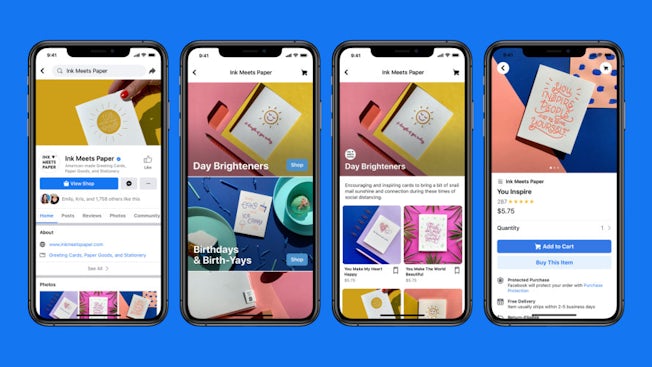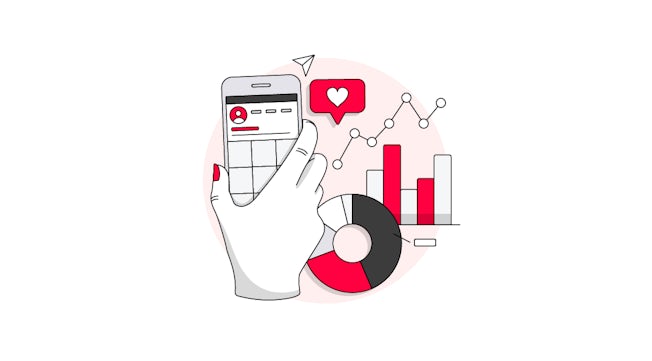Then, almost overnight, social commerce (which if you’re not clued in, is the merging of ecommerce with social networking features) became a reality. Buyable Pins arrived (and stayed) on Pinterest. You could check out on Instagram. And now you can shop on Facebook.
On Tuesday, Facebook announced the roll-out of Shops across Facebook and Instagram. The feature will allow businesses to create digital storefronts where they can host ‘catalogues’ of their products, with links to purchase the product either on the retailer’s website or directly within Facebook.
Shops will have an even more prominent presence on Instagram, with a dedicated Instagram Shop button taking up residence on users’ navigation bars on the app home screen later this year – in keeping with Instagram’s history as an ecommerce-friendly platform, home to countless influencers and small businesses who use its visual interface to promote and sell their products.
There are also plans to roll out Shops across Facebook’s social chat apps WhatsApp and Messenger further down the line.

A visualisation of what Shops will look like on Facebook (source: Facebook)
Seizing the online shopping opportunity
You can be forgiven for thinking, “Wait, couldn’t you shop on Facebook and Instagram already?” And you’d be right – technically, we already had Facebook Marketplace, an earlier foray into social commerce launched in 2016, as well as Checkout on Instagram, introduced in 2018.
Even WhatsApp added some ecommerce functionality in 2019 with a catalogue feature for its app WhatsApp Business, which allowed businesses to create a storefront on the app which listed products for sale – although transactions still took place outside of WhatsApp.
What Shops represents for Facebook, therefore, is less of a sudden move into social commerce – which it’s been working, with varying degrees of success, to break into for years – than a unified approach across its platforms. But that doesn’t make it any less significant.
Plans to launch Shops were already afoot before the coronavirus crisis hit – of course, because it would have been very difficult to turn something so huge around in the space of a few months – but Facebook significantly sped up its development in order to capitalise on the huge shift to online shopping that’s currently taking place in the midst of the pandemic, as well as giving struggling small businesses an easy way to sell online.

Facebook is far from the only tech platform that has moved to fill the sudden demand for online shopping solutions and offer a lifeline to businesses: last month, Google made it free for merchants in the US to list products on Google Shopping, another development that was already in the works but was sped up thanks to the coronavirus crisis.
Shopify relaunched its parcel tracking app Arrive as ‘Shop’, transforming it into something much more akin to a marketplace, in a move that many predicted would put it in competition with Amazon; it also recently partnered with Pinterest to launch a new app within Shopify that gives merchants a quick way to upload catalogues to Pinterest and turn their products into shoppable Pins.
But Facebook’s move has the potential to be more momentous than all of these, given its status as a titan of the social media world and the owner of three immensely popular social networks (I’m counting Messenger as part of Facebook in this, even though it’s more often treated as a separate product these days).
While I don’t think it will turn Facebook into Amazon’s biggest rival overnight, a lot of businesses already have established presences on Facebook and Instagram – and Facebook just gave them the ability to sell products directly through its platform. And for those who are looking to set up shop for the first time, Facebook and Instagram are well-known platforms with a wealth of how-to articles and guides on how to get started, which significantly lowers the barrier to entry.
With the launch of Shops, Facebook has also partnered with eight different third-party shopping platforms including Shopify, BigCommerce and Woo, which will no doubt make the transition easier on businesses that are established with these platforms. Shopify has announced that it will be launching a “new, unified Facebook channel” that allows merchants to automatically connect their Shopify business to Facebook in one place, while still making the experience feel native to each individual app.
Some commentators have noted that the launch of Shops represents a move away from Facebook’s “roots” as a purely advertising-focused business towards ecommerce, putting it in direct competition with the likes of Amazon and eBay. However, ultimately, Shops will benefit Facebook’s advertising business most of all, giving businesses more incentive to purchase Facebook ads to advertise their Shops – and allowing Facebook to collect shopping transaction data on its users, which it can use to target ads.
Therefore, the launch of Shops has the double benefit of giving Facebook’s advertising a shot in the arm while also positioning it to take advantage of an upswing in online shopping adoption that looks set to last well beyond the end of the pandemic.
The arrival of live commerce?
One interesting development that has been tucked away in the middle of the coverage about Facebook Shops is this (from Business Insider’s coverage):
“Facebook is also letting brands and creators who use its livestreaming tools tag products in their videos, allowing for the possibility [of] QVC-style shopping channels on Facebook and Instagram and letting influencers plug their sponsors when they go live.”
Initially, Facebook will just be testing the feature with businesses on Facebook and Instagram, but intends to “roll it out more broadly in the coming months.”
Last month I wrote about four trends in Chinese retail that the west can learn from, the first and foremost of which was live commerce: the merging of livestreamed entertainment and shopping. Live commerce is a major trend in China and has been key to the way that businesses sell to consumers during the coronavirus lockdown, allowing them to fill both a demand for entertainment and a demand for shopping – whilst also giving an extra dimension to the online shopping experience.
Live commerce in the west, however, has been all but non-existent, with a lacklustre launch of Amazon Live the only thing that comes close – until now. While the livestreaming functionality hasn’t been a primary focus of the launch of Facebook Shops, it has the potential to be huge if businesses latch onto it – so we should watch this space.

This pub has been one of the few trades which dont lean on PR releases to fill editorial slots. Breathless cheerleading pieces like this signal that’s no longer the plan, which sucks.
We need hard critique especially when it comes to these deathstar platforms like Facebook, Google, Amazon, Tencent et al. They have built their kingdoms based on the brute violence of value extraction. All at the expense of the brands and businesses who are your subscribers and advertisers. All to the benefit of their shareholders who become even more emboldened as they are enriched each time they read these shamelessly these promotional wet kisses.
Please reconsider writing a more critical analysis of product releases like this, through the lens of the questioning client (as we consultants call them) not the voracious platforms.